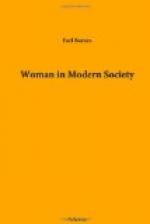to fight back any advanced ideas which might disturb
their own comfort. The feeling within this group
of leaders, and the failure of oncoming generations
of American women to recognize the debt of obligation
they owe to its efforts, was illustrated by an incident
that came up in connection with the Third International
Congress of Women which met in London in 1899.
The session was opened in Westminster Town Hall, with
seven hundred delegates present, representing the most
thoughtful women of the world. Lady Aberdeen
was in the chair, and Mrs. Creighton, wife of the
late Bishop of London, was reading a paper. In
the midst of deep attention, a door at the rear of
the platform was gently opened, and Miss Susan B.
Anthony stepped onto the stage. She had just arrived
from America. Her strong figure was bent with
the weight of years; her face was squared by the conflict
and partial ostracism she had met; but her glance
had lost none of its stern kindliness, and her bearing
none of its indomitable courage. As she appeared,
this most representative audience of women in the
world sprang to its feet and burst into wild cheering.
In vain did Lady Aberdeen rap for order and beg the
audience to let Mrs. Creighton proceed. Not until
Miss Anthony came to the front and urged the women
to sit down was quiet restored. These women knew
the price of a life which their champion had paid
for their opportunities.
A few months after this the school children of the
prosperous city of Rochester, N.Y., where Miss Anthony
had been a leading citizen for many years, were asked
to write school compositions in which they named the
person they would most wish to be like. Over three
thousand girls, in the elementary grades, wrote these
papers, but not one chose Miss Anthony. This
first generation of women reformers could not establish
the type of womanhood for the modern world; they had
not the leisure, nor the freedom, nor could they see
all that lay in the future. But all the more,
because their lives were hard, should they be held
in grateful remembrance.
To the second generation of leaders belong women like
Alice Freeman Palmer, Mary Sheldon Barnes and Charlotte
Perkins Gilman. They came on the scene when the
first campaign had been won; they could command their
own bodies and property; college doors were swinging
open where they could secure the training that should
fit them for the struggle to win educational, industrial,
social and political opportunity for all their sisters.
They were still looked upon as blue-stockings and queer;
they had often to serve as the butt of ridicule; but
they had education, income, a certain degree of leisure,
and a social recognition which, if grudging in some
quarters, was all the more generous in others.




